End of businesspublished at 22:14 GMT 26 November 2014
With that, the evening session draws to a close. MEPs will resume proceedings tomorrow from 08.00 GMT for the fourth and final day of this plenary session. Goodnight.
Hit 'Key Video' for Jean-Claude Juncker's presentation to MEPs of his proposed €300bn investment package to boost the struggling EU economy.
On-demand video for the rest of the day's proceedings can be found on the Democracy Live website.
Mr Juncker's speech was followed by a debate on the EU's position at an upcoming UN climate change conference taking place in Peru next month.
Before the lunchtime voting session, MEPs welcomed Dr Denis Mukwege, a Congolese gynaecologist, to receive Parliament's top human rights award.
The afternoon saw debates on the issue of Palestinian statehood and the 25th anniversary of the UN Convention on the Rights of the Child.
In the evening, MEPs debated the recent G20 summit, the digital single market and the current state of the EU steel industry.
Text can be slow to load on these pages. Please hit refresh (F5) if live text does not appear below.
Paul Seddon
With that, the evening session draws to a close. MEPs will resume proceedings tomorrow from 08.00 GMT for the fourth and final day of this plenary session. Goodnight.
"We must protect the competitiveness of the steel industry in Europe" says industry and market commissioner Elżbieta Bienkowska, adding that she thinks the future of the industry in Europe must be based on "quality, know-how and skills".
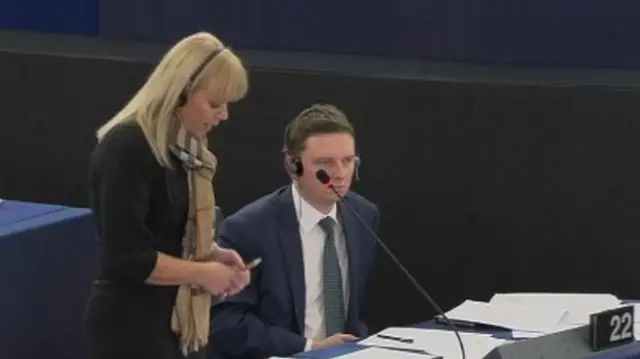
Rosa D'Amato, from Italy's Five Star movement, is the last scheduled speaker on the list tonight.
We'll now have a short round of "catch-the-eye", during which MEPs who were not on the list to speak will have the chance to do so.
After highlighting his 20 years' experience in the steel-making industry, UKIP MEP Bill Etheridge says it is the "restriction of regulation" that has stopped the continent's producers trading competitively.
He proposes the construction of a "new generation of nuclear power stations" as a possible solution to the industry's long-term decline in the UK.
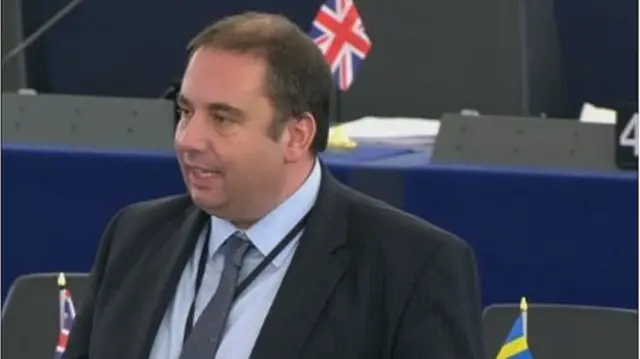
"I wonder if reindustrialisation of Europe means going back to what we know" muses Croatian liberal MEP Ivan Jakovcic, who underlines the former dependence of the steel industry on the ship-building industry.
The Commission's action plan has evidently not pleased French Front National MEP Dominique Bilde, who calls it the "umpteenth declaration full of pious promises".
As of last year, steel demand in Europe was 27% below the pre-crisis level, with employment having fallen in the sector by 10% from 2007 to 2011.
Despite this, the EU is still the second largest producer of steel in the world, with an output of over 177 million tonnes of steel a year, which is around 11% of global output.
Italian Socialist Roberto Gualtieri, who heads the Parliament's economic and monetary affairs committee, says he thinks the Commission's 2013 Steel Action Plan has played a role in reinvigorating the steel industry in Europe, but that the EU must now go "beyond" its terms to meet the new "challenges of the global economy".
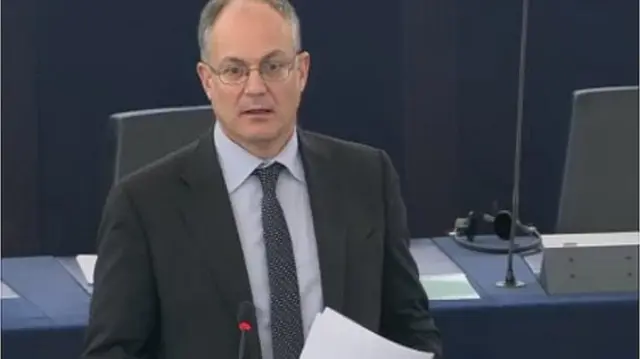
Tonight's debate follows on from the publication this summer of a Commission report on the European steel industry, providing an update on an action plan for the industry prepared last year.
It reported 60,000 job losses in the industry since 2007, with production dropping from 210m tonnes in 2007 to 166m tonnes last year.
Commission vice-president for the digital single market Andrus Ansip closes tonight's debate on the single market by lending his support for the Parliament's proposals on the telecoms market, adding that the single market needs to adapt to technologies "about to come on to the market in the near future".
That's the debate on an EU digital single market finished. The three resolutions will be voted on tomorrow.
The final item on tonight's agenda is a statement from the Commission on the state of the steel industry.
A 2010 study, external commissioned by the European Policy Centre claimed that the EU could grow its GDP by 4% by bringing about a single market for digital services.
Bulgarian centre-right MEP Eva Paunova signals her support for the abolition of roaming charges in Europe, which she says would be a "revolutionary step" towards securing greater economic growth.
Last April, MEPs voted overwhelmingly to scrap roaming charges - which are costs incurred by people using their mobile phone when abroad - across the EU.
With the approval of EU governments, the aim is to scrap charges completely from 15 December next year.
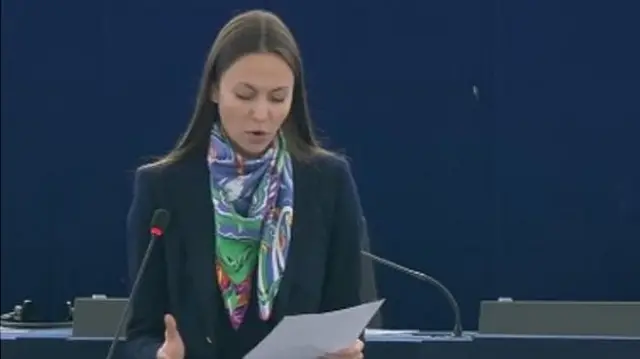
Liberal MEP Kaja Kallas says she is disappointed the discussion this evening has turned into "an anti-Google debate"
She calls on MEPs to reject over-regulation of the internet, and says its institutions could learn from the example of Estonia - where she says there is culture of digital entrepreneurship.
Estonians today vote and pay tax online. Health records are online too - read more about developments here.

Commission President Jean-Claude Juncker has already said that creating a digital single market is going to be one of the top priorities of the new EU executive, external, which took office at the start of this month.
German Green Julia Reda says the EU needs a new law on "net neutrality" - but what is it?
The term is used to describe a situation in which internet users can gain access to all online services without experiencing a slower-than-usual connection.
The issue became widely known when national telecoms regulators began accusing Internet access providers of slowing down traffic for certain services - in favour of paid platforms.
The European Parliament voted last April in favour of strict net neutrality rules, which now have to be agreed by the Council of Ministers.
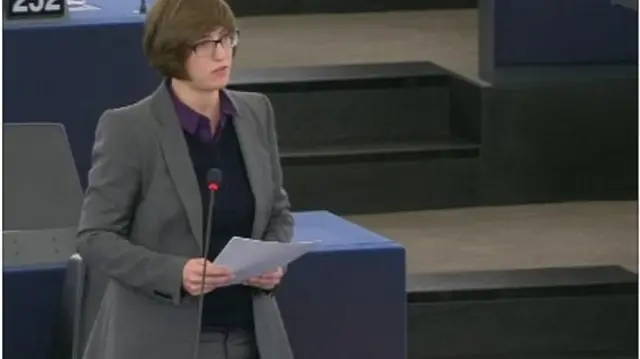
"It's high time the Commission came up with a result," says German Socialist Evelyne Gebhardt, in reference to the antitrust investigations.
She outlines her belief that if the EU's digital market is allowed to become dominated by a small number of companies, it will be difficult for digital entrepreneurs emerging from Europe's universities to become successful.
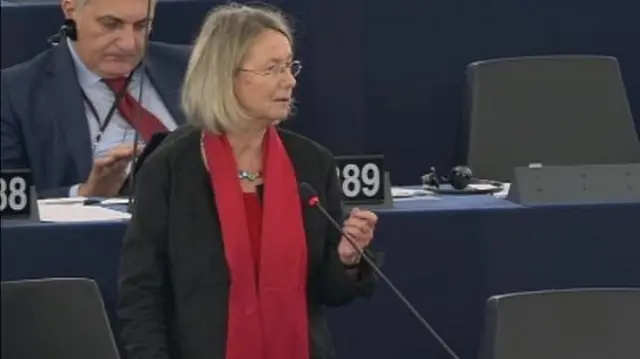
Andrus Ansip - the Commission vice-president for the digital single market - mentions the Commission's ongoing anti-trust investigations into Google, which it has been carrying out for four years, following complaints from some of its rivals.
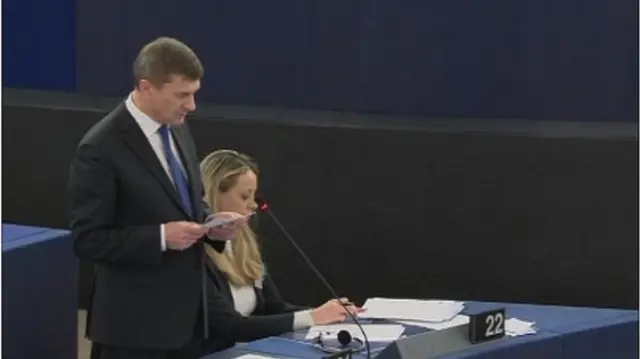
It has yet to deliver a verdict.
Such a "digital single market" would seek to create a single market for digital services across the EU, similar to the single markets the EU advocates for goods and services.
Following some changes to the agenda approved on Monday, this debate will now include discussion of three motions, which will be put to the vote tomorrow.
Two of the motions support the "unbundling" of the different activities of search engines, such as Google.
The MEPs say this would prevent the other commercial services that it provides - like YouTube - from benefiting from the company's dominant position in the search engine market.
The Parliament itself has no power to split up a firm in this way - but MEPs are hoping to put pressure on new EU competition commissioner Margrethe Vestager to take a tougher line against the American company, whose dominance is a matter of concern for some EU politicians.
Italian MP Sandro Gozi closes this debate on the G20 summit on behalf of the Council of Ministers by signalling his agreement with some MEPs about the need for a "change in economic approach" in the EU, and concludes by also giving his approval to the plans announced by Jean-Claude Juncker this morning.
He reiterates, however, the need for member countries to remain within the terms of the EU's Growth and Stability Pact, which limits public deficits of member countries to 3% of national GDP.
That's the statement on the recent G20 summit finished. The next item on this evening's agenda is a statement from the Commission on the "digital single market".
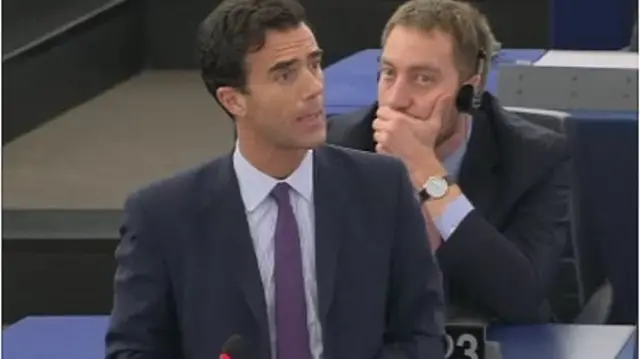
Italian Socialist Nicola Danti says that restoring growth in Europe will not just involve internal EU policies, but also a "global commitment" involving countries around the world.
Nevertheless, he signals his approval for the investment package unveiled by Jean-Claude Juncker this morning, saying that he feels it represents a "volte-face" in EU policy, and evidence that it has left the "path of austerity".
